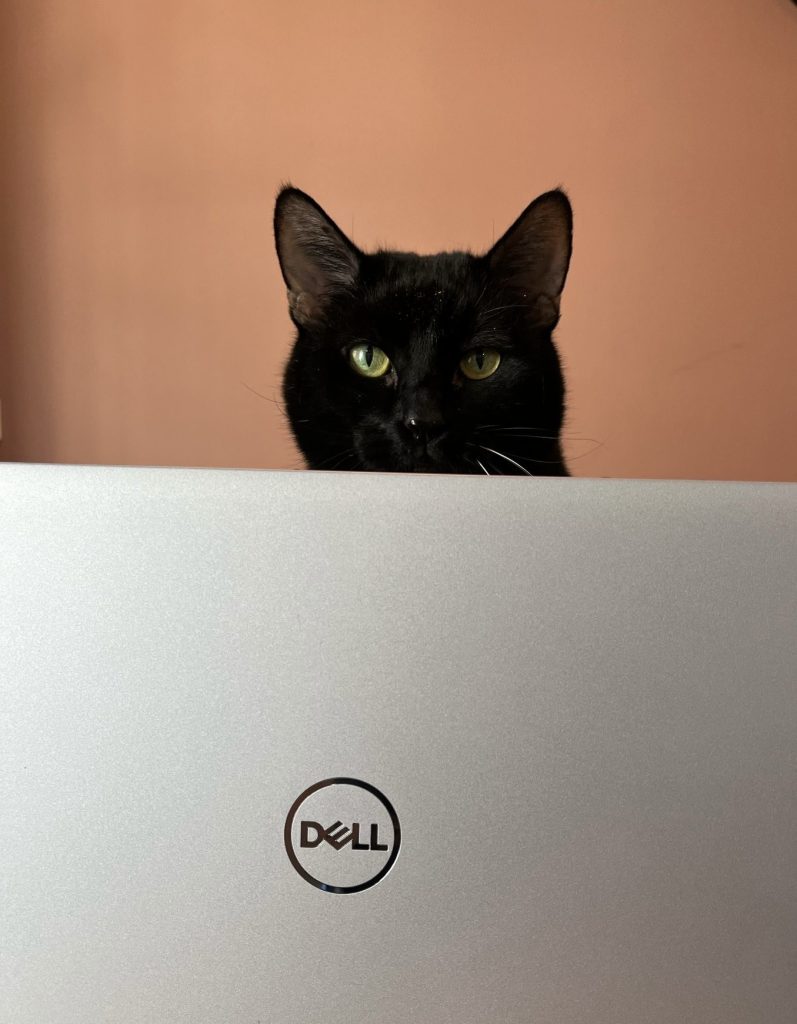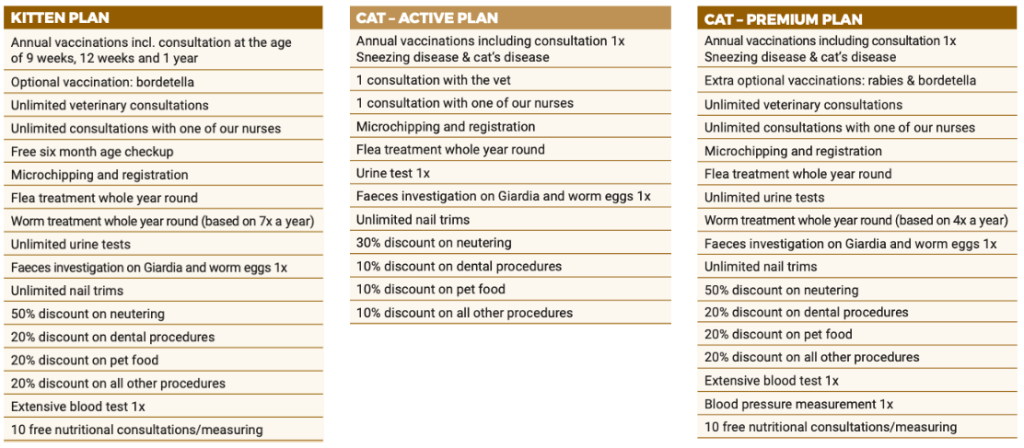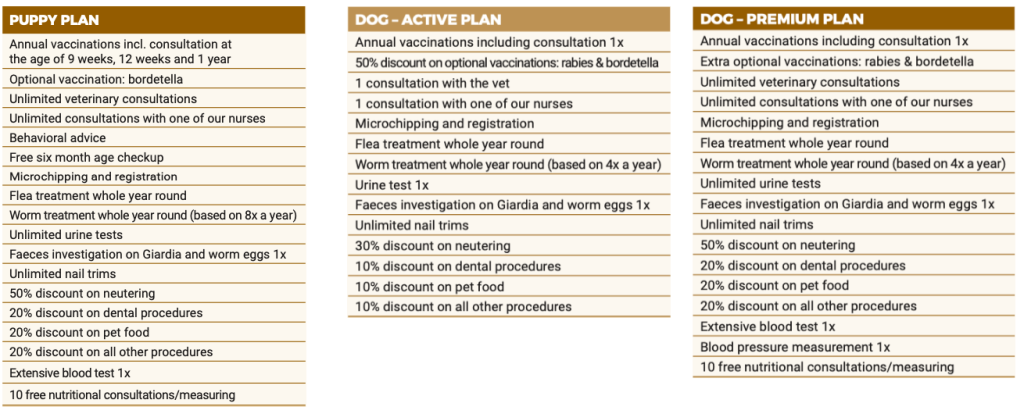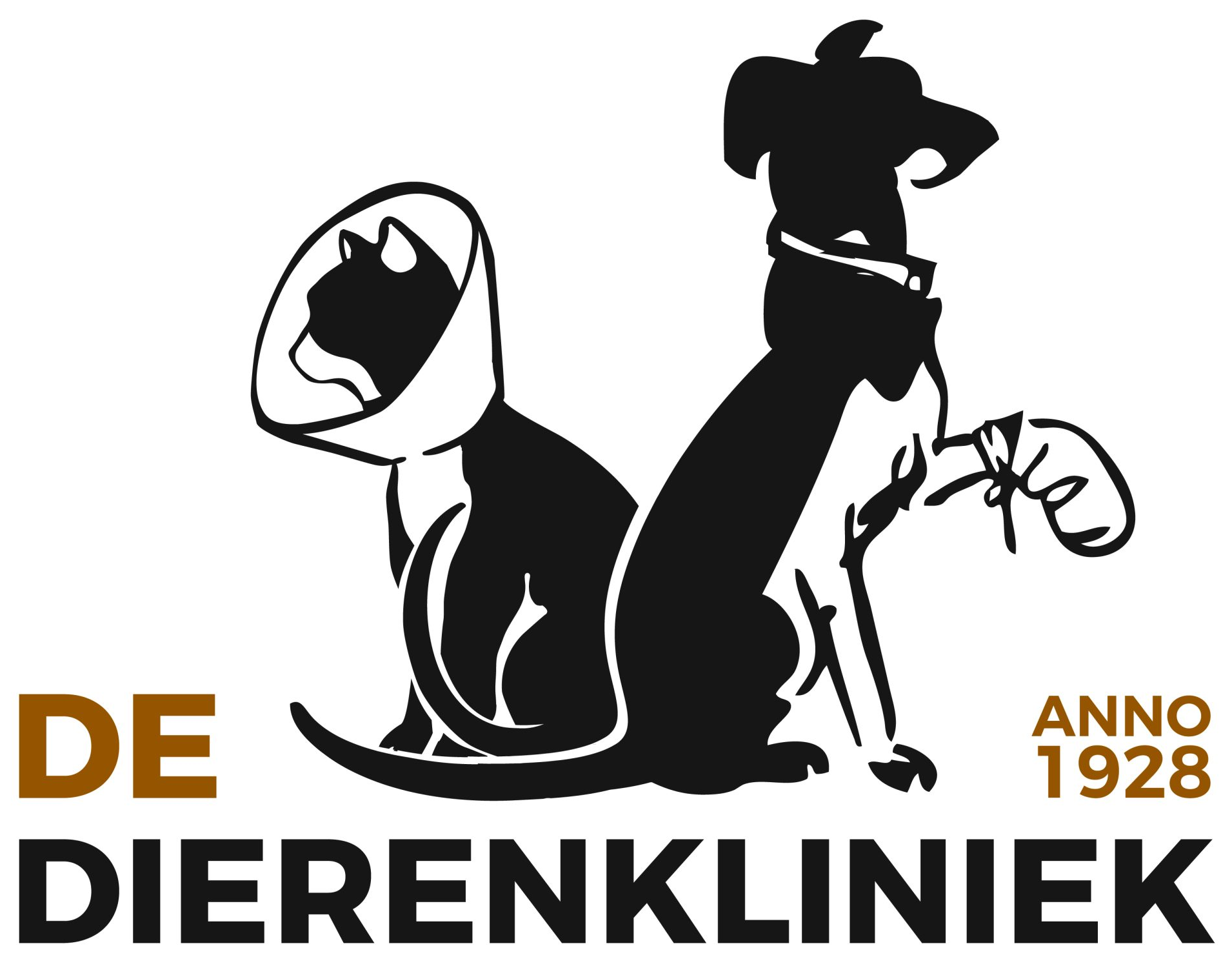FAQ

Welcome to our frequently asked questions!
Here you’ll find answers to common questions about pets and our services.
Whether it’s about nutrition, medication, travel, or other topics, we’re happy to provide you with clear and helpful information.
Can’t find the answer you’re looking for? Feel free to contact us, we’re always happy to help!
- All
- Clinic Visit
- Happy Pet Health Plan
- Nutrition
- Other
- Spaying & Neutering
- Travel
- Vaccinations
- Worming and Flea prevention
Can I have a regular veterinarian for my pet?
Yes, you can. You are always welcome to request a regular veterinarian for your pet. We will schedule your appointments with the same vet as much as possible to ensure continuity of care.
You can view our team here to see which veterinarians work at our clinic.
Booking an appointment online? Then you can select the veterinarian of your choice yourself. This way, you can be sure your pet is seen by someone who knows them well and is familiar with their medical history.
When should my pet be vaccinated?
Initial vaccinations are given when your pet is young, followed by booster shots to maintain protection.
The exact timing varies by species. See the pages below for the vaccination schedules for your dog or cat.
Which diseases are pets vaccinated against?
Cats
Cats are routinely vaccinated against feline panleukopenia (cat flu) and feline upper respiratory disease (rhinotracheitis/calici virus). The upper respiratory disease vaccine is given annually (depending on living conditions), while the panleukopenia vaccine is given every three years. Kittens follow a different schedule. If your cat travels abroad, a rabies vaccination is required.
View the vaccination schedule for your cat.
Dogs
Core vaccinations for dogs include distemper, adenovirus (hepatitis), parvovirus, and leptospirosis (Weil’s disease). Depending on living conditions in the Netherlands, an additional vaccination against kennel cough (containing Bordetella and parainfluenza) may be recommended. If your dog travels abroad, a valid rabies vaccination is required.
View the vaccination schedule for your dog.
Rabbits
We vaccinate rabbits against two diseases: myxomatosis and rabbit hemorrhagic disease (RHD1 and RHD2). Both are viral diseases that can affect domestic rabbits. A single annual vaccination is sufficient to provide good protection.
Can my pet be vaccinated if it isn’t feeling well?
It is important that your pet is in good health at the time of vaccination. If your pet is not feeling well—due to illness, fever, or reduced appetite—the veterinarian will usually postpone the vaccination.
A weakened immune system can make the vaccine less effective or cause a stronger reaction. During the consultation, the veterinarian will always assess your pet’s health and discuss with you the best time to vaccinate.
Does my pet need annual vaccinations if it only lives indoors?
Even if your pet lives exclusively indoors, vaccination is often still important. Some viruses can be brought into the home via clothing, shoes, or new pets. Additionally, some vaccines provide protection for several years, while others need to be repeated annually.
We will review with you which vaccinations are truly necessary based on your pet’s living situation. A titer test can also help determine whether a vaccination is needed.
Which vaccinations can a titer test check, and how does it work?
A titer test measures the level of antibodies in your dog’s blood to determine whether vaccination is currently needed. This helps avoid unnecessary vaccinations.
For dogs, a titer test can be done for distemper, hepatitis, and parvovirus. The test requires only a small blood sample, and results are usually available quickly. Based on the results, the veterinarian can decide whether your dog needs a vaccination or is still adequately protected.
What is the best food for my dog or cat?
The best food for your pet depends on factors such as age, breed, health, lifestyle, and medical conditions. We work exclusively with high-quality brands that are made with proper ingredients and supported by scientific research. This ensures your pet receives food that is safe, complete, and balanced.
Things to consider:
For dogs
- Puppies (up to 12 months): Food tailored for growth and development
- Adult dogs: Standard or premium food, based on breed, size, and activity level
- Senior dogs: Support for joints and adjusted energy content
- After neutering/spaying: Metabolism changes; food with adjusted energy helps prevent weight gain
For cats
- Kittens (up to 12 months): High in protein and fat for healthy growth
- Adult cats: Tailored to activity and health needs
- Senior cats: Support for kidneys, joints, and other age-related concerns
- After neutering/spaying: Lower energy content helps maintain a healthy weight
Special diet food
For pets with medical conditions such as kidney issues, allergies, overweight, or gastrointestinal problems, we offer special prescription diets. These diets are developed to support specific health problems and are always recommended in consultation with the veterinarian.
When should I switch from puppy/kitten food to adult food?
The transition from puppy or kitten food to adult food depends on age, size, and breed, and can differ between dogs and cats.
For dogs:
- Small breeds (up to 10 kg adult weight): usually around 12 months
- Medium breeds (10–25 kg): around 12–15 months
- Large and giant breeds (>25 kg): often around 15–18 months, as they grow longer and require a different nutritional plan
For cats:
- Most cats can switch to adult food around 12 months, sometimes earlier for smaller breeds or later for larger cats
Important:
- After neutering or spaying, your pet’s metabolism changes. Their calorie requirements may decrease, while the need for essential nutrients remains the same. Adjusted food (for sterilized pets) or portion sizes can help prevent weight gain.
- The transition to adult food should be gradual to avoid digestive problems. A schedule like the standard 7-day food transition plan works well.
- Our pet nutrition specialist can advise on the right timing and type of food, creating a personalized plan based on your pet’s age, breed, weight, and health.
Can I change my pet’s food abruptly?
It’s important to transition to new food gradually to prevent stomach and digestive issues. A proper transition might look like this:
- Days 1–2: 75% old food + 25% new food
- Days 3–4: 50% old food + 50% new food
- Days 5–6: 25% old food + 75% new food
- Day 7: 100% new food
Monitor your pet during the transition for symptoms such as diarrhoea or vomiting.
My pet has been unwell since changing food. What can I do?
If your pet shows symptoms after a food change, it may be due to a (too rapid) transition to the new food or a sensitivity to certain ingredients. You can do the following:
- Temporarily stop the new food and observe if the symptoms improve.
- Note which symptoms occur and how often.
- Contact us if the symptoms persist.
Our veterinarian or pet nutrition specialist can work with you to find a suitable food and advise on a gradual transition to support your pet’s digestion.
What can I do if my pet is overweight?
If your pet is overweight, it’s important to help them lose weight in a healthy way. Exercise, portion sizes, and the right type of food all play a role.
At our clinic, you can consult our pet nutrition specialists. They provide personalized nutritional advice tailored to your pet’s age, weight, lifestyle, and any health issues. Together, we create a plan to help your pet lose weight safely and responsibly.
What do I need to travel abroad with my pet?
When traveling with your pet, the following basic rules apply:
- Your pet must have a European pet passport.
- Your pet must be microchipped (tattoos are no longer valid).
- Your pet must be vaccinated against rabies. This vaccination must be given at least 21 days before departure and follow the vaccination schedule. Vaccination can be given from 3 months of age.
- Some countries have additional requirements, such as a health certificate or treatment against certain worms. This applies, for example, to the United Kingdom, Ireland, and Malta.
For some countries outside the EU, a rabies antibody blood test must be carried out prior to travel. Please note that this procedure can take several weeks.
For specific import requirements per country, visit www.licg.nl. When traveling to or from the United Kingdom, pay attention to the changed rules since Brexit. More information is available on the UK Government website.
We provide personalized travel advice and can help you plan and prepare the necessary documents tailored to your pet and destination.
Can I get a pet passport for my pet at your clinic?
Yes, you can. To issue an EU pet passport, we need the following information:
- Pet details: name, species, breed, sex, and date of birth.
- Identification: your pet must have a registered microchip.
- UBN number (dogs): for dogs, the UBN number is required to register the passport correctly.
We will guide you step by step in filling out and checking the passport.
Can you issue a health certificate for my pet?
Yes, we can. In addition to issuing the certificate, we also provide personalized travel advice so you know exactly which vaccinations, tests, and documents are required for your destination.
How far in advance should I request a passport or health certificate?
We recommend requesting a passport or health certificate at least 3 weeks before departure. This allows enough time for any necessary vaccinations, blood tests, or additional documents required for your destination.
It is also possible to request a passport or certificate urgently for faster processing. Please note that additional fees may apply.
Can I get a calming medication for my pet for travel or a flight?
It is possible to obtain medication that helps reduce stress for your pet during travel.
However, do not give your pet a calming medication for a trip without first consulting our veterinarian. Sedatives can lower blood pressure and body temperature, which may cause breathing problems or other health risks, especially during a flight. Additionally, some airlines do not allow animals that are heavily sedated on board.
Our veterinarian can advise you on safe options for your pet.
How do I know if my pet has worms?
It’s not always immediately visible if your pet has worms. Symptoms can include:
- Swollen belly
- Reduced appetite
- Diarrhoea or visible worms in stool or around the anus
- Coughing and/or vomiting
- Weight loss
- Lethargy
- Itching around the rear
Young animals or pets that spend a lot of time outdoors are at higher risk.
The veterinarian can perform a fecal test to check for worms and advise on the appropriate treatment or preventive measures.
How often should I deworm my pet?
How often your pet needs deworming depends on age, environment, and risk of infection. Puppies and kittens are dewormed more often, while adult pets usually receive preventative treatment a few times a year.
Find out how frequently to deworm your dog or cat with our recommended schedules:
Which deworming treatment do you recommend?
There are various types of deworming products available. We only recommend products that have been carefully tested for safety and effectiveness.
The most commonly used are deworming tablets, often flavored to make it easy to mix with your pet’s food. If your pet won’t swallow tablets, you can also use a deworming paste or administer the treatment with a pipette.
Always ensure you give the correct dosage according to your pet’s weight. Our assistants are happy to help you choose the right product.
How often should I treat my pet for fleas and ticks?
How often you should treat your pet for fleas depends on the product you use. Most treatments last 1 or 3 months. Year-round protection is important, as fleas can appear even in autumn and winter. Our veterinarian can recommend the right product and schedule for your pet’s age, weight, and environment.
Which flea and tick treatment do you recommend?
We only use products that are veterinarian-registered and available exclusively through veterinary clinics.
This ensures that the products are safe, effective, and of high quality.
Our veterinarian or assistant will be happy to advise you on the best treatment for your pet based on their age, weight, and living environment.
Can I buy the medication from you without a prescription?
Yes, flea and worm treatments can be purchased from us without a prescription.
We are happy to help you choose the right product and dosage. For this, it’s important that we know your pet’s weight and age so that you receive a safe and effective treatment.
Do I need an appointment, or can I come without one?
Appointments are required for routine treatments to give your pet the time and attention they need. For emergencies, you can always come in directly—please call ahead if possible so we can be ready for you.
How can I make or change an appointment?
Making an appointment
Booking an appointment is very easy online via our website. You can choose the time that suits you best.
Of course, you can also make an appointment by phone at +31 20 6620101, and we’ll be happy to assist you personally.
Changing or cancelling an appointment
If you booked your appointment online, you can easily change it via the link in your confirmation email.
If you made your appointment another way, please contact us by phone, email, or WhatsApp, and we will gladly adjust it for you.
We kindly ask that you cancel or change your appointment at least 24 hours in advance. If this is not possible, we may have to charge a portion of the reserved time.
What should I bring to the appointment?
Please bring your pet’s passport or vaccination booklet so we can check and update all records.
If this is your first visit and your pet is on medication, please also bring an overview or the packaging of the medication. If you are visiting for a specific issue, it is helpful to bring any previous test results or reports from another veterinarian.
You can also ask your current or previous veterinarian to send your pet’s complete medical records to us before the appointment. They can email them to: info@dierenkliniekvondelpark.nl
Can someone else bring my pet to the appointment if I cannot attend?
Yes, that is no problem. Someone else may bring your pet to the appointment.
We do ask that the person bringing your pet is well informed about the reason for the visit and can explain any complaints or special considerations. Payment must still be made immediately after the appointment.
Is it possible for someone else to collect my pet’s medication?
Yes, someone else may collect the medication for your pet. Please note that, by law, we are not allowed to hand out medication to anyone under the age of 18.
We kindly ask you to provide your pet’s name and your own details so we can ensure the correct medication is given.
Payment must be made at the time of collection.
How does payment work after a consultation or treatment?
Payment is made immediately after the consultation or treatment at the counter. You can pay by debit card, cash, or credit card. Would you like to know the expected costs in advance? We are happy to provide a price estimate so there are no surprises.
If you have pet insurance, you will receive an invoice that you can submit to your insurance company yourself.
Does the clinic offer emergency services?
Our clinic provides emergency care during regular opening hours, so your pet can receive prompt attention for acute issues. Our location Dierenkliniek Vondelpark is also open on Saturdays from 10:00 AM to 4:00 PM.
If you have an emergency, please call us immediately and select the “Emergency” option in the menu.
For emergencies outside our opening hours, you can contact:
- Medisch Centrum voor Dieren: +31 20 7400600
- Evidensia Dierenziekenhuis Amsterdam: +31 20 3080750
Do you work with pet insurance?
We do not bill insurance companies directly, but you will receive an invoice that can be submitted to your insurer. Payment is made at the clinic after your visit.
Are you an independent clinic or part of a chain?
We are an independent clinic, not part of a chain, which allows us to provide personalized care and make decisions that are best for your pet.
Can I change my veterinarian?
Yes, you are free to change your veterinarian at any time and choose the one that best suits you.
If you switch to our clinic, we would like to receive your pet’s medical records. This ensures we have the complete history and can continue to provide the best possible care for your pet.
What are your rates?
You can find our rates per location on our website here:
Would you like to know the expected costs in advance? We are happy to provide a price estimate for the consultation or treatment, so you won’t be faced with any surprises.
What’s included in the Happy Pet Health Plan?
The Happy Pet Health Plan includes the essential preventive care for your dog or cat. We offer three different types of plans:
- Active Plan
- Premium Plan
- Puppy & Kitten Plan
Happy Pet Health Plan for your cat

Happy Pet Health Plan for your dog

What are the benefits of the Happy Pet Health Plan?
The benefits of our Happy Pet Health Plan include:
- Regular check-ups for your pet
- Tailored preventive care
- Discounts of up to €400 per year
- Monthly payment options
What is the Happy Pet Health Plan?
The Happy Pet Health Plan (HPHP) is a subscription that bundles all the preventive care your dog or cat needs to stay healthy. This way, you can be sure your pet receives the right care at the right time, while also enjoying attractive discounts on products and treatments.
We offer three different packages, tailored to your pet’s age and health:
- Puppy & Kitten Plan: specially designed for the first 12 months of your young pet’s life.
- Active Plan: for adult dogs and cats in good health.
- Premium Plan: with more comprehensive care and higher discounts on additional products and services.
The Happy Pet Health Plan helps you provide consistent care for your pet’s health and wellbeing, without any surprises.
Please note: the Happy Pet Health Plan is not a pet insurance, but a preventive care plan offered exclusively at our clinics.
How do I request a repeat prescription?
You can easily request a repeat prescription by email, phone, or at the counter. Please provide your pet’s name, the medication name, and the dosage.
Our veterinarian will assess whether the medication can be prescribed again. Please note that in some cases, a check-up appointment may be required, for example if the treatment has been ongoing for a long time.
Once the prescription is approved, we will inform you when the medication is ready for pickup.
Can I order medication if I am not one of your clients?
Yes, this is possible. However, we require a prescription or a complete record from your previous veterinarian. This allows us to verify which medication your pet is taking and ensure it can be safely provided.
Without this information, we are legally not allowed to dispense any medication.
Can I order pet food or medication from your clinic?
Yes, you can. You can order both pet food and medication from us via email, phone, or at the counter.
Medication that requires a prescription must always be prescribed by a veterinarian. We are not allowed to provide these medications without a prescription.
Our assistants are happy to help you place your order and can also advise you on pet food or long-term medication.

